Papers by Ana María Ochoa Gautier
Revista de estudios sociales, 2000

Annual Review of Anthropology, 2021
Recent work in anthropology has attended to the imbrication of music, sound, listening, and langu... more Recent work in anthropology has attended to the imbrication of music, sound, listening, and language in research on, and from, Latin America and the Caribbean, as part of a broader movement across regions. In this article, we argue that these relations have their own intellectual genealogies in Latin America and the Caribbean, which have often been neglected in studies written about the region. We focus on recent theorization of aurality-the immediate and mediated practices of listening that construct perceptions of nature, bodies, voices, and technologies. We provide an overview of regional discourses on the interrelations of voice, orality, and writing, and then we discuss the aural turn in four areas: race; migration; socialization and youth cultures; and epistemologies of history, memory, and heritage. We put different bodies of discourse into dialogue as a means of charting a path toward decolonial (inter)disciplinary transformations that are built on other histories, vocalities, and modes of knowledge.

Los silencios de la guerra t, 2017
Resumen Vivimos tiempos inciertos y turbulentos en los que la guerra no se libra únicamente en tr... more Resumen Vivimos tiempos inciertos y turbulentos en los que la guerra no se libra únicamente en trin cheras o en campos de batalla sino en los escenarios más variados. Durante el siglo xx y en lo que va corrido del siglo xxi, hemos sido testigos de guerras múltiples que han dejado tras de sí millones de víctimas, de testimonios y de silencios. Los autores que contribuyen con sus aportes intelectuales en este libro provienen de diversos países como Colombia, Alemania, México, lispaña y Estados Unidos y a su vez, pertenecen a diversas disciplinas, entre las que se encuentran la filosofía, la historia, Ja literatura, la música, la sociología y el derecho. Desde estos saberes, los autores reflexionan sobre los silencios de la guerra en relación con la memoria y el lenguaje, el daño, el psicoanálisis, los dispositivos acústicos de las cárceles, el trauma, la violencia y el perdón. En algunos textos de este libro el análisis da cuenta de las realidades de sus países, y en otros el tema se aborda desde una construcción teórica, pero siempre situada. Invitamos a los lectores a emprender este viaje sorprendente y revelador a través de los múltiples silencios que dejan a su paso la violencia, la guerra y los regímenes totalitarios. Un libro novedoso que reúne diversas perspectivas sobre el silencio, tema crucial y contundente pero poco explorado pues lo que ha caracterizado a las guerras modernas es precisamente su estridencia, atrocidad y persistencia. Será, por lo tanto, un viaje sorprendente y revelador.

In recent years, questions regarding music, sound, and nature have intensified. This intensificat... more In recent years, questions regarding music, sound, and nature have intensified. This intensification is visible in various domains of musical practice, such as the increased audibility of composers involved in acoustic ecology as both practitioners within and theorizers of the field; the global presence of sound collectives employing audio recordings and music scholarship for the purpose of denouncing environmental problems; and the emergence of what are considered "new fields" of study, such as ecomusicology, biomusic, and zoomusicology. This coincides with a growing interest in listening and in sound as phenomena and the institutionalization of sound studies as a disciplinary field.¹ Finally, it coincides with a renewed I thank Julio Ramos, Jairo Moreno, and Gavin Steingo for helpful critical and generous conversations and comments, and Margaret Havran for her editorial work on this essay. I would also like to thank Arturo Escobar and Enrique Leff for their help and encouragement, even though a deeper engagement with the specific elements of their work has inevitably been left for another moment. The responsibility of the content of this essay is, of course, mine. Unless otherwise noted, all translations are my own. 1. Jonathan Sterne, ed., The Sound Studies Reader (Durham, NC: Duke University Press, 2012); Michael Bull, ed., Sound Studies (London: Routledge, 2013).
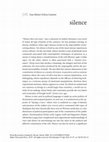
silence "Silence does not exist," says a character in Andrés Neuman's 2010 novel El Viajero del S... more silence "Silence does not exist," says a character in Andrés Neuman's 2010 novel El Viajero del Siglo (Traveler of the century). He was perhaps echoing, in literary rendition, John Cage's famous words on the impossibility of perceiving silence. Yet silence is lived as one of the most intense experiences across cultures. On the one hand, silence invokes a type of plenitude most commonly associated with contemplative techniques of quietness as a means to bring about a transformation of the self Corbin 1997). On the other, silence is often associated with a "sinister resonance" (Toop 2010) that invokes a haunting; the dangers and fear of the unknown; the insecurities produced by the ungraspable and by the profound irreversibility of death. We also find this sinister dimension in the constitution of silence as a means of torture, in practices such as extreme isolation, where the sense of self is lost due to sensory deprivation, or in kidnapping, whose expediency depends on the efficacy of silencing techniques as a tortuous means of emotional manipulation. Between these experiential extremes, silence appears as a term "by which we understand our existence as beings in a world larger than ourselves, a world not entirely of our making, whose limits and constraints provide the very limits and constraints of thought itself " (Grosz 2011: 99).
Popular Music, 2005
... of the rise of popular music in the region such as those by Robin Moore ( 1997 ) with respect... more ... of the rise of popular music in the region such as those by Robin Moore ( 1997 ) with respect to Cuban music, Peter Wade (2000 ... Today, the term vallenato is used to designate a group of music genres paseo, son, puya and merengue bound together by what have come to be ...

This paper explores how practices of sonic recontextualization enacted by both folklorists and th... more This paper explores how practices of sonic recontextualization enacted by both folklorists and the music industry during the first half of the twentieth century have been crucial to the constitution of an aural modernity in Latin America. This is mediated simultaneously by the contradictory practices of epistemologies of purification*which seek to provincialize sounds in order to ascribe them a place in the modern ecumene and epistemologies of transculturation*which either enact or disrupt such practices of purification. Through this I wish to argue that the aural has been a sphere of crucial constitution of Latin America's highly unequal modernity, one that is significant not only in the contemporary sonic turn but that also played a role in defining the very idea of a Latin American lettered modernity. I also explore the relation of this to the construction of epistemologies of traditional and popular music in Latin America and their role in the constitution of musical 'knowledges otherwise'. I particularly explore the politics of knowledge of some of the early twentieth cenutry folklorists and their implications for thinking about the structure of knowledge in musical disciplinary fields in a globalized, postcolonial context at a moment in which the sonic is mediating crucial fields of experience and knowledge.

In recent years the idea of "culture as resource" has been hailed as a new epistemological paradi... more In recent years the idea of "culture as resource" has been hailed as a new epistemological paradigm for assigning value and signifi cance to artistic practice. This article acknowledges this idea as determining values assigned to art in the recent context of glob alization. Yet it questions the heuristic hold of such an episteme for the interpretation of some cultural practices, especially those of musicians in a world where many of them are not so much administering resources as managing their scarcity. It thus explores the disjuncture between the idea of care of the self, invoked by using the performativity of culture as the basis of the resource paradigm, and the actual practices of musicians in promoting careers that demand investments of money, affect, time, and other resources in order to sustain those careers. In such situations, musicians often privilege other values of music-aesthetic desires, stylistic options, and so on-as primary epistemic and affective reasons for determining their choices and what they fi nd valuable in music. I explore this through the work of two Colombian musicians with contrasting careers and musical styles and practices, Lucía Pulido and Charles King.

Although anthropological and critical social theory have a long interest in sensory experience, w... more Although anthropological and critical social theory have a long interest in sensory experience, work on the senses has intensified within the past 20 years. This article traces three sensory genealogies within anthropology: the work of Ong and McLuhan as critiqued and advanced by David Howes and the Concordia Project; phenomenological studies as advanced by Paul Stoller; and a focus on materialities as advanced by Nadia Seremetakis. Studies of individual senses, which we survey, led to calls for a more integrated approach to the senses, both within anthropology and from cinema and media studies. In various ways, the senses are constituted by their imbrication in mediated cultural practices, whether mediated by technology, discourse, or local epistemologies. We argue that integrating language and discourse into the study of the senses along with new media insights more fully articulates the significance of body-sensorial knowledge. 51 Annu. Rev. Anthropol. 2010.39:51-66. Downloaded from www.annualreviews.org Access provided by Columbia University on 10/03/15. For personal use only.

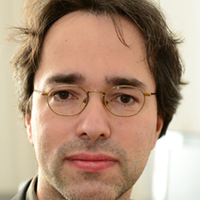


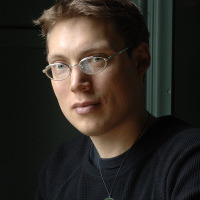



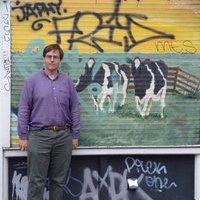

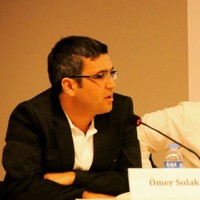
Uploads
Papers by Ana María Ochoa Gautier